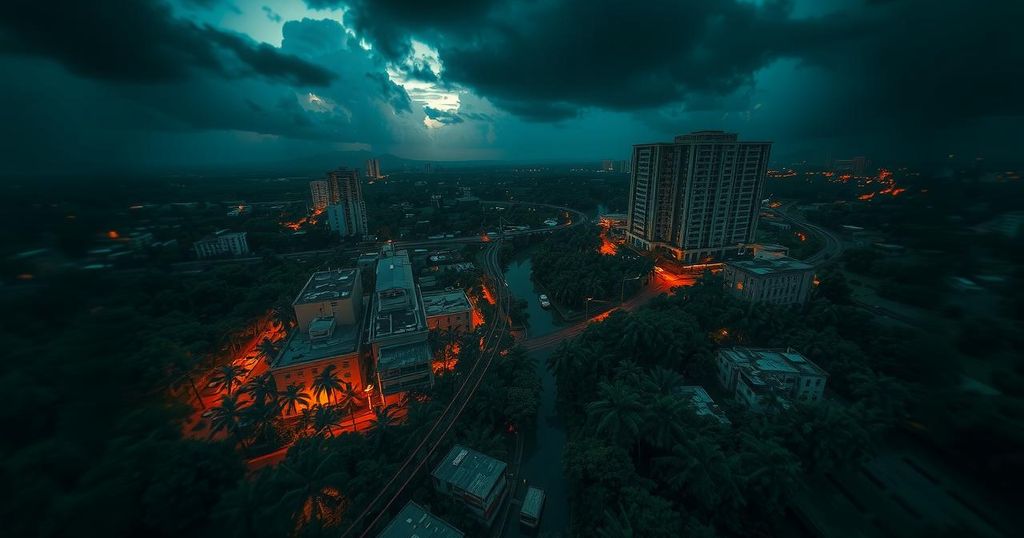Cuba Endures Third Day Without Power as Hurricane Oscar Approaches
Cuba has faced a power outage for three consecutive days affecting millions, exacerbated by Hurricane Oscar’s impending arrival. While 16% of the electrical grid was reportedly restored, failures continue to disrupt essential services, leading to public discontent and questions regarding external support. The government blames a combination of factors, including U.S. sanctions and infrastructure deterioration, for this crisis.
As of Sunday, millions of Cubans have been without electricity for three consecutive days following repeated failures to restore power in the wake of significant disruptions. Reports indicate that only approximately 16% of the nation has regained access to electricity, with the deteriorating energy grid once again failing on Saturday evening. This situation represents the third full collapse of Cuba’s energy infrastructure since Friday, a crisis that has left most of the nation’s 10 million citizens experiencing sustained power outages. The utility of recovery efforts is expected to be significantly hampered by the imminent threat of Hurricane Oscar, which is approaching eastern Cuba and is predicted to bring heavy winds and hazardous surf conditions. According to the National Hurricane Center, Hurricane Oscar made landfall on Inagua Island in The Bahamas, packing maximum sustained winds of 80 miles per hour. The hurricane is anticipated to reach Cuba’s northeastern coast later this afternoon and may weaken following landfall; however, it could still retain tropical storm status as it travels north of Cuba and into the central Bahamas. Cuba’s energy issues began on Friday with the failure of one of its major power plants, leading to the first island-wide blackout. Despite initial reports of gradual power restoration, a second nationwide blackout occurred early Saturday, exacerbating the crisis. These blackouts have raised the prospect of deeper turmoil for the communist-ruled nation, particularly as the stability of water supply and food preservation increasingly depends on reliable electricity. In an atmosphere of desperation, residents in Havana are turning to WhatsApp to share information about areas with power, with some coordinating the storage of essential medications in the few places still having electricity. The scarcity of basic goods is prompting long queues for bread in Havana, leading to disputes among residents over perceived inequities in distribution. As the crisis unfolds, questions have arisen regarding the absence of support from Cuba’s traditional allies, including Venezuela, Russia, and Mexico, who have previously supplied vital resources such as oil to aid in maintaining electrical power. Despite the dire circumstances, tourists remain evident in Havana, albeit many hotels have run out of generator fuel and therefore lack power. Reports confirm that Cuba’s José Martí International Airport is currently operating only on emergency power, leading to disruptions in standard practices such as ticket issuance and air conditioning. Protests have emerged as citizens demand accountability for the ongoing energy woes. Cuban authorities attribute the energy crisis to a combination of complications, including heightened U.S. economic sanctions, recent hurricane disruptions, and deteriorating infrastructure. During a recent televised address, which faced technical delays, Prime Minister Manuel Marrero Cruz stated, “We have been paralyzing economic activity to generate (power) to the population.” Health Minister José Angel Portal Miranda assured on X that health facilities are relying on generators to continue offering critical services amid the power shortages.
Cuba has faced chronic challenges within its energy sector, which are now exacerbated by recent events including the impact of hurricanes and a deterioration of the overall infrastructure. Additionally, economic sanctions imposed by the United States have further complicated the nation’s ability to maintain a stable and modern electrical grid. The cumulative effects of these factors have resulted in significant outages that threaten vital services for the population, such as healthcare and food preservation. The handling of electricity supply has become a critical concern for the Cuban government, especially in light of weather-related challenges.
The ongoing power crisis in Cuba, which has now extended to three days, is a manifestation of deep-rooted infrastructural issues compounded by recent natural disasters and geopolitical tensions. As Hurricane Oscar approaches, the situation is expected to worsen for the beleaguered populace, who are struggling to navigate the challenges of disrupted supplies and basic services. The Cuban government’s measures to manage power distribution and recovery efforts remain crucial as the nation grapples with both immediate and long-term consequences of this energy crisis.
Original Source: www.cnn.com




Post Comment